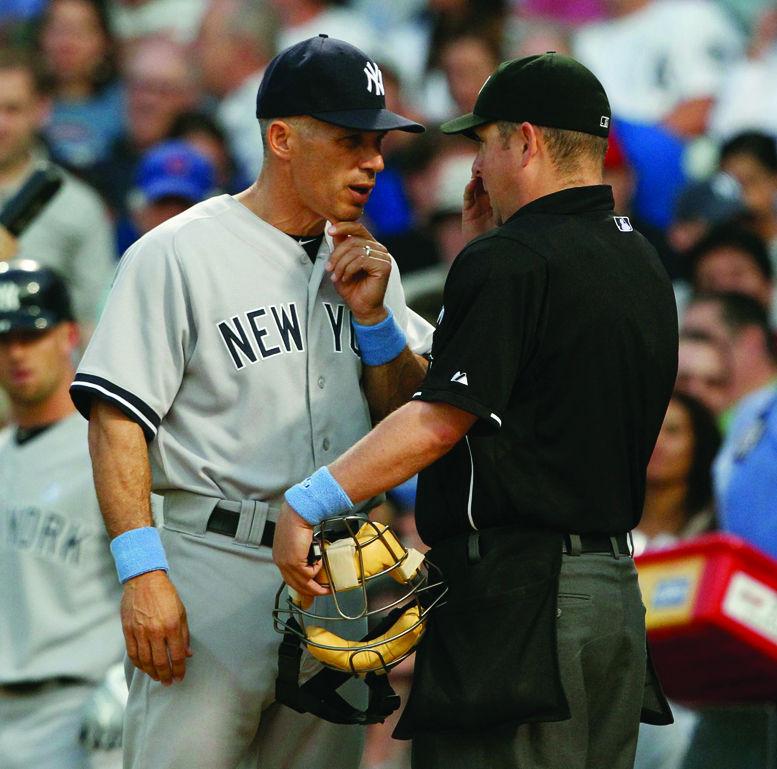Large payrolls do not always translate to playoff success
September 23, 2014
I grew up thinking I didn’t hate the Yankees. Then, around age 12, I realized what a moron I’d been and thought about the amount of time I wasted not hating the Yankees. So, I blindly hated the Yankees. And then I learned how the world works and how money works — what difference is there, really? — and I didn’t need to blindly hate the Yankees anymore, because I could hate them for a reason.
Here I am, at 21 years old, and there are few things on this earth more beautiful than watching the New York Yankees collapse into a smoking heap of irony and justice.
Baseball’s second-biggest spenders (damn you, L.A. Dodgers) will miss the playoffs for — cue the world coming to a screeching halt — the second consecutive year. But the postseason must go on, even though most of America will be too busy swimming in the tears of the Bronx to notice. My apologies go out to Derek Jeter, who deserves every ounce of respect and praise he receives. It doesn’t seem fitting for our generation’s face of baseball to exit without a final playoff appearance, but I’m willing to overlook a Jeter-less playoff season for the greater good.
Before the 2014 season started, the Yankees’ front office went out and signed four of the biggest names in free agency — Jacoby Ellsbury, Masahiro Tanaka, Brian McCann and Carlos Beltran — for a combined $438 million. For those of you non-math-oriented kids out there like me, that’s about 438 million times more money than we have in our bank accounts. This year, the Yankees dished out $75 million to those four combined. Add in longtime Orioles disabled list staple Brian Roberts for another $2 million. Couple these commitments with the existing talent on the roster, and you find yourself with a one-year, $200 million empire of might.
But how did this empire of might become an empire of mediocrity? One would assume that dishing out astronomical salaries year in and year out would virtually purchase a spot in the playoffs, but the patent-pending Yankee Method has failed for two consecutive seasons. In fact, three of the four highest-paying teams — New York, Philadelphia at $180 million and Boston at almost $163 million — all missed the 2014 playoffs, and the latter two missed by wide margins.
Rather, it’s the so-called “small-market” teams that deal a mere $75 to $110 million to their players each year that are making a playoff push. The Baltimore Orioles ($107.5 million) clinched Tuesday night. The Oakland Athletics ($83.5 million) have essentially locked up playoffs in the American League. The Kansas City Royals ($92 million) and Pittsburgh Pirates ($78 million) are still firmly in the hunt. The Milwaukee Brewers ($104 million) are down but not mathematically out.
But what hasn’t worked for the Yankees, Phillies and Red Sox has worked for a few clubs this year. The correlation between money and wins can be made for the Los Angeles Dodgers, the Detroit Tigers and the Los Angeles Angels, who rank first, fifth and sixth in salary this year. All three should make the playoffs. Last year, the San Francisco Giants and their $140 million payroll finished 10 games under .500. This year, at nearly the same price, they’re a near-lock for the postseason.
So why does big spending work for some teams and not others? Why does it work for a team one year and not the next? What is the most effective model for building a professional baseball team that wins consistently?
If you answered, “Who knows?” “I can’t answer that,” or “No idea,” to those three questions, you pass the test. Baseball is fickle, and payrolls aren’t necessarily indicative of a team’s performance. The Boston Red Sox won the World Series last year with a payroll $12 million below what this year’s cellar-dwelling team in the same uniform made. This is one of the few things as sweet as watching the Yankees crumble. High payrolls are found on top of the standings and at the bottom. The same goes for low-spending clubs. The Oakland Athletics was the best team in baseball for the first four months of the season, and its payroll is nearly $50 million under that of one of baseball’s worst teams, the Texas Rangers.
But the world has always found the Yankee way to be evil. Throwing eight-digit yearly salaries at players already considered superstars is certainly a more in-your-face business practice than, say, developing young talent in the minor leagues. Sure, any team that wishes to compete will make a free agent signing when necessary. But the Yankees have a habit of buying in excess at times, if for no other reason than being able to afford it. And that’s what makes the world angry. That’s why the Yankees are so actively despised in the sports universe. That’s why I nearly bought an orange T-shirt with a slogan that read “God hates the Yankees” on Craigslist.
But rather than waste my money, I think I’ll choose the free alternative: to Google “sad Mark Teixeira” and “Brett Gardner bald” until my stomach splits from laughter. And then I’ll watch the Orioles in the playoffs, and all will be well in the world.
For now, at least.



